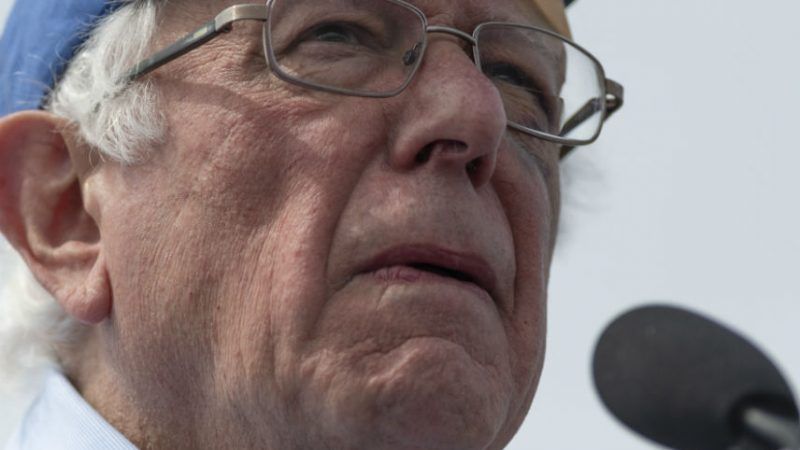Democratic Dystopias
Donald Trump's opponents are aping his apocalyptic style

From his opening campaign declaration that "the American dream is dead," to his creatively capitalized warning just last month that "without strong Borders we don't have a Country," Donald Trump has proven again and again that an apocalyptic style works in contemporary American politics.
The president's 2020 challengers, alas, have followed Trump's lead.
"We are at an inflection point in in the history of our world," Sen. Kamala Harris (D-Calif.) pronounced when kicking off her candidacy in January. "We are here because the American dream and our American democracy are under attack and on the line like never before."
Voters in the 1864 primaries might beg to differ, but that's not stopping the presidential primary field from serial declarations of catastrophe.
"Today, millions and millions and millions of American families are … struggling to survive in a system that has been rigged by the wealthy and the well-connected," Sen. Elizabeth Warren (D-Mass.) said last month when announcing her presidential bid. "Millions of families can barely breathe."
Imagine the tracheal stress if unemployment was above 4%!
Sen. Bernie Sanders (I-Vt.) has been hurling paranoiac thunderbolts at the "oligarchy" for as long as he's been in politics. "We have created a system which is basically out of control," he lamented in February to CBS' John Dickerson, which is why "Now it's time to complete that revolution."
We have grown accustomed to politicians of both parties, especially those not in power, drastically overselling what Barack Obama (channeling Martin Luther King) was fond of calling the "fierce urgency of now" — calls to action that need immediate attention — usually in the form of voting for the politician sounding the alarm. Republicans heading into the 2016 election breathed a manic new energy into the tradition, beginning with Trump's first rant about Mexican "rapists," which set off a bidding war to see who could bring the most crazy to the visa-policy debate. (My favorite came from first generation Indian American Bobby Jindal: "Immigration without assimilation is an invasion.")
With his bottomless reservoir of hellscape hyperbole, Trump demonstrated daily that the apocalyptic style was a ticket in alienated America for leapfrogging more staid establishment politicians.
Those conservative intellectuals who didn't leap off the Trump train learned by the time of his nomination to love the hyperbole, including most notably in the Claremont Review of Books' "Flight 93 Election." That article, written under a pseudonym by Michael Anton, who later joined and then left the Trump administration, analogized a Hillary Clinton presidency to a plane hijacked by suicidal terrorists. "Charge the cockpit or you die," Anton counseled. "You may die anyway. … [But] if you don't try, death is certain."
Since every winning strategy in America's two-party political system ends up being copied by the losing side, the Democrats' march toward a paranoid dystopia should not surprise.
House Intelligence Committee Chairman Adam B. Schiff (D-Burbank) has been amply rewarded in the media ecosystem for making casual suggestions that the president of the United States is working for another team. Fellow committee member Eric Swalwell (D-Dublin) told Vanity Fair in January that "over the last six months, there has only been more evidence that the president has been acting on Russia's behalf."
And if early response to the Mueller report summary is any guide, don't expect much left-of-center walkback from the past two years of increasingly conspiratorial speculation about Trump/Russia.
Heading into 2020, we should expect more and louder howling into the wind, even from the most professionally upbeat 2020 Democrats.
"Society does not value work anymore," Sen. Cory Booker (D-N.J.) warned in South Carolina on Saturday. "We have a real crisis in this country over financial stability."
Even Beto O'Rourke, in between countertop jumps and motivational rah-rah, is accessing the dark side. "The civil war in Syria, the wildfires in California — we literally are making it happen," the toothsome Texan said in New Hampshire last week. "And unless we act in the next 12 years … there will be a hell visited upon our kids and grandkids and the generations that follow."
Why do people talk like this? Because it speaks to our species. Humans are hardwired to believe that the sky will fall, no matter how much cleaner, healthier and richer our environs become over time. Our evolutionary parents and grandparents, after all, survived precisely because they suspected that that rattle in the bushes might well be a sabertooth tiger.
But the moral of "The Boy Who Cried Wolf" is not that there is no wolf, but rather that warnings should be saved for when the beast actually arrives. The president's apocalyptic fantasia is disreputable on its face, and leads to bad policies. Democrats should resist the temptation to emulate what they despise.
This article originally appeared in the Los Angeles Times.


Show Comments (67)